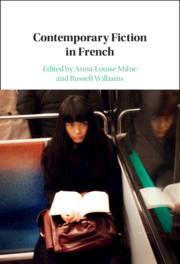Book contents
- Contemporary Fiction in French
- Contemporary Fiction in French
- Copyright page
- Contents
- Figures
- Notes on Contributors
- Introduction
- Chapter 1 Mediterranean Francophone Writing
- Chapter 2 After the Experiment
- Chapter 3 Getting a Future
- Chapter 4 Contemporary French Fiction and the World
- Chapter 5 The Franco-American Novel
- Chapter 6 Graphic Novel Revolution(s)
- Chapter 7 ‘Back in the USSR’
- Chapter 8 Fictions of Self
- Chapter 9 Trauma, Transmission, Repression
- Chapter 10 Wretched of the Sea
- Chapter 11 Urban Dystopias
- Chapter 12 Imagining Civil War in the Contemporary French Novel
- Notes
- Select Secondary Bibliography
- Index
Chapter 11 - Urban Dystopias
Published online by Cambridge University Press: 30 March 2021
- Contemporary Fiction in French
- Contemporary Fiction in French
- Copyright page
- Contents
- Figures
- Notes on Contributors
- Introduction
- Chapter 1 Mediterranean Francophone Writing
- Chapter 2 After the Experiment
- Chapter 3 Getting a Future
- Chapter 4 Contemporary French Fiction and the World
- Chapter 5 The Franco-American Novel
- Chapter 6 Graphic Novel Revolution(s)
- Chapter 7 ‘Back in the USSR’
- Chapter 8 Fictions of Self
- Chapter 9 Trauma, Transmission, Repression
- Chapter 10 Wretched of the Sea
- Chapter 11 Urban Dystopias
- Chapter 12 Imagining Civil War in the Contemporary French Novel
- Notes
- Select Secondary Bibliography
- Index
Summary
In France, the democratization of culture through education and technology has been accompanied by new forms of social, economic and spatial inequality most readily tangible on the peripheries of major cities, and in particular on the eastern edges of its global capital. Henri Lefebvre presaged these inequalities in Le Droit à la ville / The Right to the City (1968), wherein he apprehended the accelerated growth of the banlieues (or suburbs) as decisive in the shift from the circumscribed city to generalized urbanization. As Lefebvre commented later in 1985, ‘les banlieues étaient le spectre de la ville’ / ‘the banlieues were the spectre of the city’, representing the failure of the state’s urban governance to provide a qualitative urban space that served the working classes. While in the 1950s and 1960s, the term ‘banlieues’ retained positive connotations of larger living spaces, fresh air, light and modernized living conditions, by the early 1980s, a discursive imaginary of deprivation and delinquency had emerged in the press around the cités, or suburban high-rise housing estates. Both an affirmation of existence and a cry of revolt, the advent of ‘beur’, and later, ‘banlieue literature’, made visible the complex realities and everyday lives which such discourses reduced to stereotypes. In synergy with the 1981 riots of Minguettes and the ‘Marche des Beurs’ / ‘the Beur March’, foundational works, such as Mehdi Charef’s Le thé au Harem d’Archi Ahmed (1983) / Tea in the Harem (1989), led the way for a generation of authors whose writing raised questions of ethnicity and difference, attesting to the experience of the marginal, the postcolonial and suburban, and contesting the limits and idealism of French republicanism. Within literary theory, postcolonialism endorsed the heterogeneity of notions of ‘rootedness’, taking up postmodernism’s attendance to fractured subjectivities, but with a keen concern to ground such fractures in external social and historical structures. In these evolutions, the space of the city has been formative. Defined by the heterogeneity of their cultural, historical and spatial intersections, urban and suburban spaces become primary sites for testing the practical limits of national identity and the disjunctures at the heart of the Republic’s supposed indivisibility. Importantly, these disjunctures are often mapped spatially as fractures between ‘centre’ and ‘periphery’, with the centre standing for intra muros Paris, or the high cultural spaces of urban elites more generally, and the periphery representing those who are geographically, culturally, ethnically and economically on the margins.
- Type
- Chapter
- Information
- Contemporary Fiction in French , pp. 199 - 218Publisher: Cambridge University PressPrint publication year: 2021



